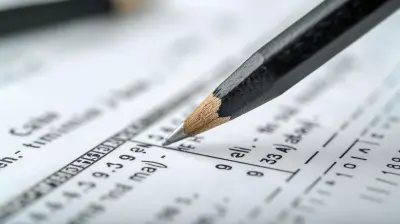Addressing the Needs of Gifted Learners: A Psychological Approach
16 September 2025
When you think of "gifted learners," what comes to mind? Maybe a child who can solve math problems faster than their peers or someone who reads at a college level in elementary school. Gifted learners are often seen as students who excel academically, but there's so much more to the picture. These students have unique psychological needs that often go overlooked, and addressing those needs is essential for their overall growth and well-being. In this article, we'll dive into the psychological aspects of giftedness and explore how educators and parents can best support these learners.

Understanding Giftedness: It's More Than Just Being Smart
Giftedness is often misunderstood. It’s not just about being “smart” or “good at school.” In fact, gifted learners can have a range of abilities that go far beyond academic achievement. Some may excel in creative arts, leadership, or have an incredible emotional intelligence. Others might show an intense curiosity, asking questions that leave even adults scratching their heads.What Does It Mean to Be Gifted?
Giftedness is generally defined as an advanced ability or aptitude in one or more areas compared to peers of the same age. However, this can manifest in various ways. Some common characteristics of gifted learners include:- Rapid Learning: They pick up new information quickly and retain it well.
- Advanced Vocabulary: They often use words and phrases that are far beyond their age level.
- Intense Curiosity: These learners have an insatiable desire to know more about the world around them.
- Creative Thinking: Gifted learners can think outside the box, offering innovative solutions to problems.
- Emotional Sensitivity: They may display heightened emotional awareness or empathy.
But here’s where things get interesting: gifted learners are not always "easy" students. They can be perfectionists, deeply sensitive, or even show signs of boredom and frustration if not appropriately challenged. This brings us to the core of the issue—understanding the psychological needs of gifted learners.

The Psychological Needs of Gifted Learners
Gifted learners are not a homogeneous group, and their psychological needs vary widely. However, there are some common themes that many educators, psychologists, and parents encounter.1. The Need for Intellectual Stimulation
Let’s be real: a bored gifted learner is not a happy learner. Gifted students often need more challenging material than what’s typically offered in a standard classroom. They crave complexity and depth, and when they don't get it, they can become disengaged, even disruptive. It’s like handing a teenager a baby rattle—they’ll lose interest in seconds.How to Address It:
- Differentiated Instruction: Tailor lessons to their advanced abilities. This could include more complex problems, independent projects, or even acceleration in certain subjects.- Enrichment Programs: These offer opportunities for gifted students to explore topics that aren’t covered in the regular curriculum.
- Mentorship: Pairing a gifted learner with a mentor in their field of interest can provide the intellectual challenge they need.
2. The Need for Emotional Support
Gifted learners are often more emotionally sensitive than their peers. They may feel isolated because they think and process emotions differently, or they might struggle with perfectionism, constantly setting impossible standards for themselves. This emotional intensity can lead to feelings of anxiety, frustration, or even depression if not properly addressed.How to Address It:
- Emotional Coaching: Teach gifted learners how to manage their emotional responses. Encourage them to express their feelings and offer strategies for coping with stress or anxiety.- Open Communication: Create a safe space where they can discuss their thoughts and emotions without fear of judgment.
- Modeling Failure: Gifted learners can be perfectionists, so it’s essential to teach them that failure is a part of the learning process. Celebrate mistakes as opportunities for growth.
3. The Social Disconnect
It’s not uncommon for gifted learners to struggle with fitting in socially. They might find it hard to relate to their peers because of their advanced thinking or intense interests. Imagine being a 12-year-old who wants to discuss quantum physics while your classmates are talking about the latest TikTok trend. That disconnect can lead to feelings of loneliness or isolation.How to Address It:
- Peer Groups: Connecting gifted learners with like-minded peers through gifted programs or extracurricular activities can help them find their tribe.- Social Skills Training: Sometimes, gifted learners need help developing social skills. This could involve role-playing different social scenarios or teaching them how to engage in small talk.
- Promote Inclusivity: Encourage all students to appreciate and celebrate differences. Create an environment where being “different” is seen as a strength, not a weakness.
4. The Need for Autonomy
Many gifted learners exhibit a strong desire for autonomy. They like to take control of their learning, often preferring self-directed projects or independent study. This need for independence can clash with traditional classroom settings, where students are expected to follow a rigid structure.How to Address It:
- Project-Based Learning: Allowing gifted learners to work on long-term, self-chosen projects can cater to their need for autonomy.- Flexible Learning Environments: Offer choices in how they learn, whether it’s through online platforms, group work, or independent research.
- Encourage Self-Assessment: Give them the tools to evaluate their progress. This fosters a sense of ownership over their learning journey.

The Role of Parents and Educators
Parents and educators play a crucial role in supporting the psychological needs of gifted learners. But finding the right balance can be tricky. Push too hard, and you risk burnout. Offer too little, and the child may become disengaged or even underachieve.For Parents:
- Advocate for Your Child: Don’t be afraid to speak up for your child’s needs in school. Gifted learners often require specialized resources, and it’s essential to ensure they’re getting the appropriate support.- Provide Enrichment at Home: Encourage your child’s interests outside of school. Whether it’s through books, documentaries, or extracurricular activities, keep their minds engaged.
- Emphasize Effort Over Perfection: It’s easy for gifted children to tie their self-worth to their achievements. Teach them that effort and progress matter more than always getting the “right” answer.
For Educators:
- Create a Flexible Curriculum: Offering a one-size-fits-all curriculum doesn’t work well for gifted learners. Incorporate flexibility to allow for deeper exploration of topics.- Foster Emotional Intelligence: Help gifted learners understand and manage their emotions. This can be through classroom discussions or mindfulness exercises.
- Build a Supportive Community: Encourage collaboration and peer support. Gifted learners can sometimes feel isolated, so creating a community where they feel valued is crucial.

The Double-Edged Sword of Giftedness
While being gifted may sound like a blessing, it can also be a double-edged sword. Many gifted learners face what's known as the "Gifted-Talented Paradox." On one hand, they’re told they’re exceptional. On the other hand, they’re expected to navigate a world that isn’t always designed for them. This paradox can lead to feelings of inadequacy, frustration, and even impostor syndrome.Gifted learners often experience asynchronous development, meaning their intellectual abilities may far outpace their emotional or social development. This can lead to inner conflict, where they feel “older” in some ways and much “younger” in others.
1. Impostor Syndrome
Many gifted learners, particularly as they grow older, may feel like they don't deserve their success. They may believe their achievements are the result of luck rather than ability. This can lead to a constant fear of being "found out" or exposed as a fraud.2. Perfectionism
Gifted learners often set unrealistically high standards for themselves. They may become paralyzed by the fear of making mistakes, which can lead to procrastination, anxiety, or even underachievement.3. Underachievement
Contrary to popular belief, not all gifted learners excel in school. Some may become disengaged or bored, leading to underachievement. In some cases, their giftedness may be overlooked altogether, especially if they don’t fit the traditional mold of what a “gifted student” looks like.Taking a Holistic Approach: The Psychological Perspective
Addressing the psychological needs of gifted learners requires a holistic approach. It’s not just about providing challenging academic material—it’s about supporting their emotional, social, and psychological well-being. This means recognizing that gifted learners are complex individuals with a unique set of strengths and challenges.Psychologists often recommend that educators and parents focus on the "whole child," emphasizing emotional intelligence, social skills, and mental health alongside academic achievement. By doing so, we can help gifted learners not only reach their full potential but also live fulfilling and balanced lives.
Conclusion
Gifted learners are a unique group of individuals who require more than just advanced academic challenges. Their psychological needs, ranging from emotional support to social connection, are just as important as their intellectual development. By taking a psychological approach to gifted education, we can create environments that nurture the whole child, allowing them to thrive both inside and outside the classroom.It's not about treating them like mini-geniuses; it's about recognizing their humanity—their strengths, challenges, and potential—and meeting them where they are.
all images in this post were generated using AI tools
Category:
Educational PsychologyAuthor:

Eva Barker
Discussion
rate this article
1 comments
Thalwen Rocha
Great insights! Understanding gifted learners' needs is essential for fostering their unique potential. Thank you!
September 26, 2025 at 12:51 PM

Eva Barker
Thank you for your kind words! I'm glad you found the insights valuable. Understanding and supporting gifted learners is indeed crucial for their development.


